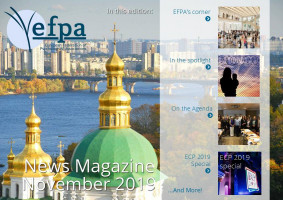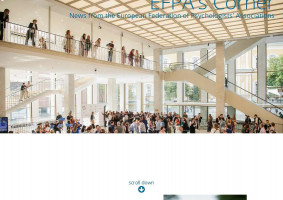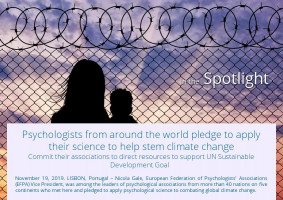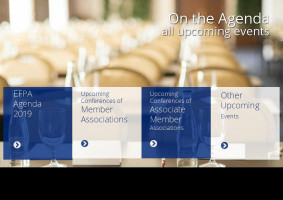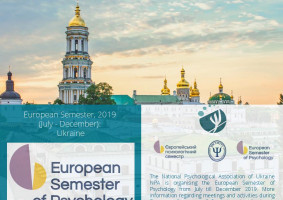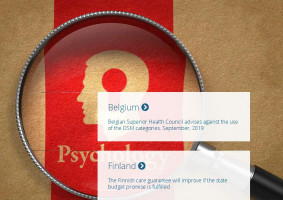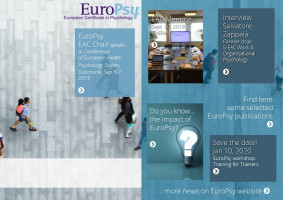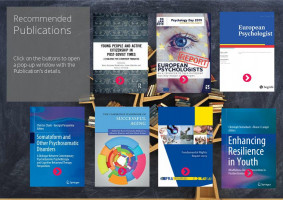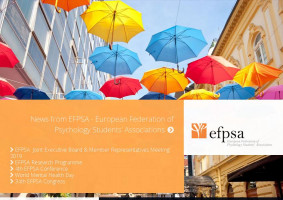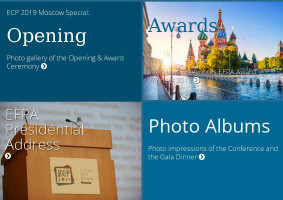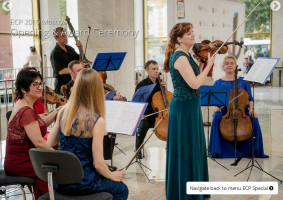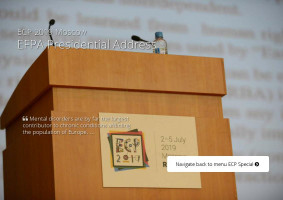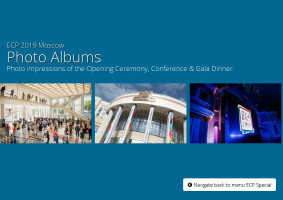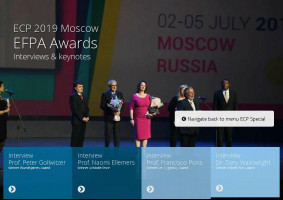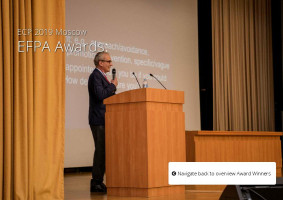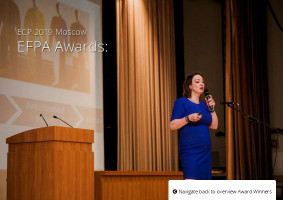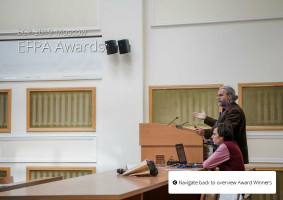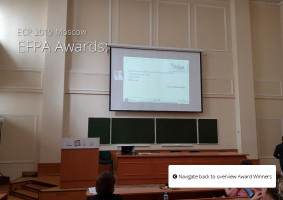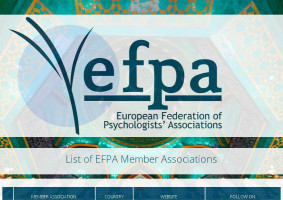Navigate back to overview Award Winners
More about the lecture of Pons in pop-up
Interview
EFPA Award winner Francisco Pons
Interviewed by Kotryna Danielevičiūtė & Ying Wai Cheung (European Federation of Psychology Students' Associations - EFPSA)
Tell us a bit about your background. How did you get into psychology?
A short answer, I traveled two years in South America a long time ago. I met a lot of psychologists and specialist of psychoanalysis in Argentina, Uruguay and at that time I was training as an architect, so I knew nothing about psychology or psychoanalysis, but I like it. Didn't understand it, but I like it. So when I came back to Europe, I thought, let's start psychology. I was working as an architect part time and studying psychology. The beginning was quiet tough, because I understood the words that people were using, but didn't understand what they want to say. Took me six months to switch from engineering mind, architect mind to psychology mind.
Do you mind if I ask at what age you switch from being an engineer to a psychologist?
I did my degree as an architect, I finished it at the age of 19, because in Switzerland at that time, they had a special program for young people to go directly to engineering school and get degree, but they stopped with that. But meaning that I started very early, too early to study architecture. I finished that, but when I finished I knew that I was not going to do that for the rest of my life. So to choose the profession so early was not so good for me. It was not my choice.
Have you ever thought about combining these two things that you learned?
Yes, I was asked that more than once, I have been trying, but not really. Didn't find the way, I have been doing some stuff about spatial orientation, perception of architecture, but didn't find how to integrate the job, but environmental psychologists and other people are doing these things, but I was not interested.
What is your current focus in psychology? As we can understand from your todays presentation, it is about impact of attachment styles on information seeking?
Today - yes, because normally I do not working so much on that. Really, the data I presented today is new data for me too. I have been working a little bit on attachment, but my main focus is about something related to the attachment, which is emotional competence, intelligence, development in children. So this attachment line is quiet new and I like it. Of course the results are not spectacular, but they are still something.
If you have no limits, what your dream projects would be, what would you like to research?
If the principle of reality didn't exist? If I could have a little army of research collaborators, here we go! The first move would be to replicate the results, just to be sure. I'm quite sure about the results. There is a sign that the Polish students answered in very different way, so is that because it is specific, specific for Poland, or because there is methodological problem that Polish students were able to reveal. We have to have that in mind. Next move would be ask students in different fields. I would like to run the same study in students of mathematics, physics, but also biology, chemistry and anthropology and see if attachment patterns are distributed in the same way. I guess it is in not exactly same proportion. Also the information seeking approach. Does that have an impact? In psychology we see that majority have tendency to ask for help, some cultures more than others. When they are secure - no problem, when they are insecure, more problematic, but is there interaction with the field of science? So that would be the next move. Different edition to culture and these kind of things.
Are you thinking of doing this research not only on students, but also adults?
Yes, as I said, I want to test junior students, but also mature PhD fellows, post doctors, professors. Does the experience that you have of doing research for example, have an impact on a strategies that you are using to look for information? Do me, more mature researcher rely more on others or the experience? Did it change compare to 20-30 years ago when I was a student? If we are speaking about no reality, only a principle of pleasure, when with elderly people, with children.
Out of curiosity, what do you assume or without doing any research, if professors or more mature researchers are more skeptical regarding first-hand experiences, or because they are doing research all the time, they would like to have first-hand experience?
As a student, at least in the beginning, you are more there to learn them. Of course you have difficulty of development the knowledge in your own way. Let's say that the balance is more about learning, than researching. But indeed the time of balance is changing, to continue to learn, but research also, so I guess that should have an impact. I guess it also attachment is one of the factor, also gender, culture, personality - I think personality plays an important role, if you have paranoia or these kind of things, that means if you ask for help, to trust what other people are saying could be a challenge. As a researcher you developed sort of avoidant attitude, where you are more critical. That means you don't take for granted what other people are saying and you don't take for granted what you find by experimenting. You developed this very critical way of thinking towards yourself and the other people. So yes, that would be my improvisation.
Could you give advice for students and young researchers or what advice you give to yourself when you were at young age?
What I tell my students in Norway, maybe I will not say the same thing in other countries that are not so protected as many countries in Europe, do what you like. That means, study what you interested at. I wouldn't say that you should not think about professional outcome, but at least you know it works very fine, do the studies that you like, do the research that you like and when you will figure it out. Of course if I be in different country, minority would be different, because the social and economic environment would be different. As a student you have big big freedom to ask your question you want, do your research that you want. As an academic also, but as professional outside of the university, the reality is going to tell you. But when you are student you can write about whatever you like, you have a lot of freedom. So I say, take a chance and maybe you are going to discover your interest. When I was a student in Geneva, studies were purely nonprofessional, it was at website of the department - we are not training the professionals. So people were studying just by curiosity, where is now I don't want to say is over, but more and more universities are training centers, where you train for your profession.
_w536_h536_1.jpg)
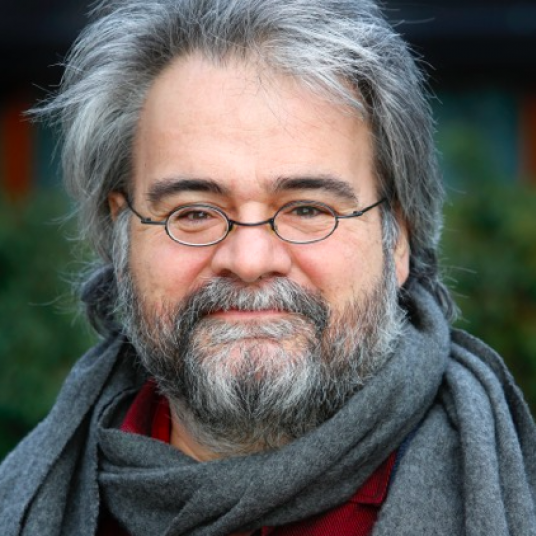
_w536_h536_1.jpg)
_w536_h536_1.jpg)
_w536_h536_1.jpg)
_w536_h536_1.jpg)
